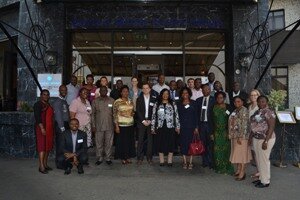As African Ministers of Economy and Finance gathered at the Seventh Annual Joint African Union (AU)-United Nations Economic Commission for Africa (UNECA) Conference in Abuja, Nigeria, the Global Network joined a lively conversation with GAVI, Roll Back Malaria (RBM) Partnership, and about 40 Nigerian reporters on how health, human capital and social development partnerships will catalyze widespread economic growth.
The AU-UNECA meetings, themed, “Industrialization for inclusive and transformative development in Africa,” could not have provided a more perfect backdrop to discuss health issues. Countries’ investments for building and sustaining strong, competitive economies need to include health services. Vibrant labor markets require a productive workforce, which is contingent on people’s health status.
Recognizing the role of health in economic growth and poverty alleviation, African leaders pledged to allocate 15 percent of their budgets to health through the Abuja Declaration. Yet 13 years post-Declaration, and the majority of African nations have not yet followed through.
With these issues at the forefront, Rotimi Sankore, coordinator of the Nigerian-based organization Afri-Dev, opened the media roundtable. He asked the journalists, “What are the success stories? What are the challenges we are facing?” He asked the development partners, “What are you contributing human capital development, health and socio-economic development? What are the gaps?”

Dr. Thomas Teuscher, deputy executive director, Roll Back Malaria (RBM) Partnership
Dr. Mercy Ahun, GAVI’s special-representative to GAVI-eligible countries, explained her organization’s role in saving lives through vaccines. GAVI spends about 64 percent of its commitments in Africa, which so far has amounted to more than five billion dollars. “Everyone in Africa knows the impact of measles on children and families. … We know that prevention is better.”
Journalists can spark a “dialogue to get a better vision for how the limited amount of development investment is channeled,” said Dr. Thomas Teuscher, deputy executive director of RBM. He also stressed why health is a priority. “You need to be in good shape, be healthy and survive to go to work every day. This is clearly a national investment. [We] need investments of governments to serve their people. This cannot just be aid finance,” he said.

Wangechi Thuo, senior program officer for Africa, Global Network
Global Network’s Senior Program Officer for Africa, Wangechi Thuo, captivated the audience about neglected tropical diseases (NTDs). After explaining how NTDs are underlying drivers of poverty, Wangechi delivered a call to action: “African governments need to increase their domestic investments in health, and be innovative in how we use resources and see where we can have cost-savings. NTDs serve as a vehicle for how you can multi-sectoral investments, and how you can pull forth greater investments in human capital and for other sectors.”
Then, journalists from Nigeria and abroad shared their insights on the state of health reporting, how they can do their part in advancing the health MDGs and post-2015 development agenda discussions, and what’s needed for fruitful partnerships between the media and development organizations.

Ms. Moji Makanjuola, head of Health Desk at Nigerian Television Authority
Making an impassioned plea for increased health reporting to hold leaders accountable, Moji Makanjuola, head of the health desk at Nigerian Television Authority, said, “We have refused to see health as an investment … that can propel the development initiatives of the continent forward…We cannot do that. Until we move the agenda to make it a political agenda, we must ask questions.”
From AllAfrica.com, CEO and Cofounder Reed Kramer explained that they’re “trying to find new ways to work with media colleagues across the continent to make reporting possible and more effective.” Another media representative present, Habiba Bello-Giwa from Nigeria’s Premium Times, later shared her collaboration with AllAfrica.com to expand her paper’s investigative journalism section.

Mr. Martins Oloja, editor, Nigeria’s Guardian Newspaper
Echoing Ms. Makanjuola’s earlier sentiments, Martins Oloja, editor of Nigeria’s The Guardian stated, “Poverty in reporting what African leaders all over the place are not doing. We need to hold them to account. Why are they not funding health matter adequately? Where is the medium? The medium is the message.”
Ultimately, it is through a comprehensive approach to health that African nations can reduce the burden of disease and other pervasive public health threats – and lift millions of people out of poverty. Through a unified push, we can provide comprehensive health access and create more equitable, inclusive growth for all Africans. It is our hope that we will continue to explore ways to work together.
Thanks to all the partners at the media roundtable for a great discussion!










